Key takeaways:
- Healthcare education inspires change and empowers communities, transforming lives through shared experiences and knowledge.
- Health volunteering enhances community health by bridging gaps in access and fostering solidarity among diverse individuals.
- Volunteering develops essential skills like communication, teamwork, and problem-solving while also presenting emotional challenges that build resilience.
- Engaging with local communities through health initiatives fosters empowerment, promotes healthier lifestyles, and addresses stigma surrounding mental health.
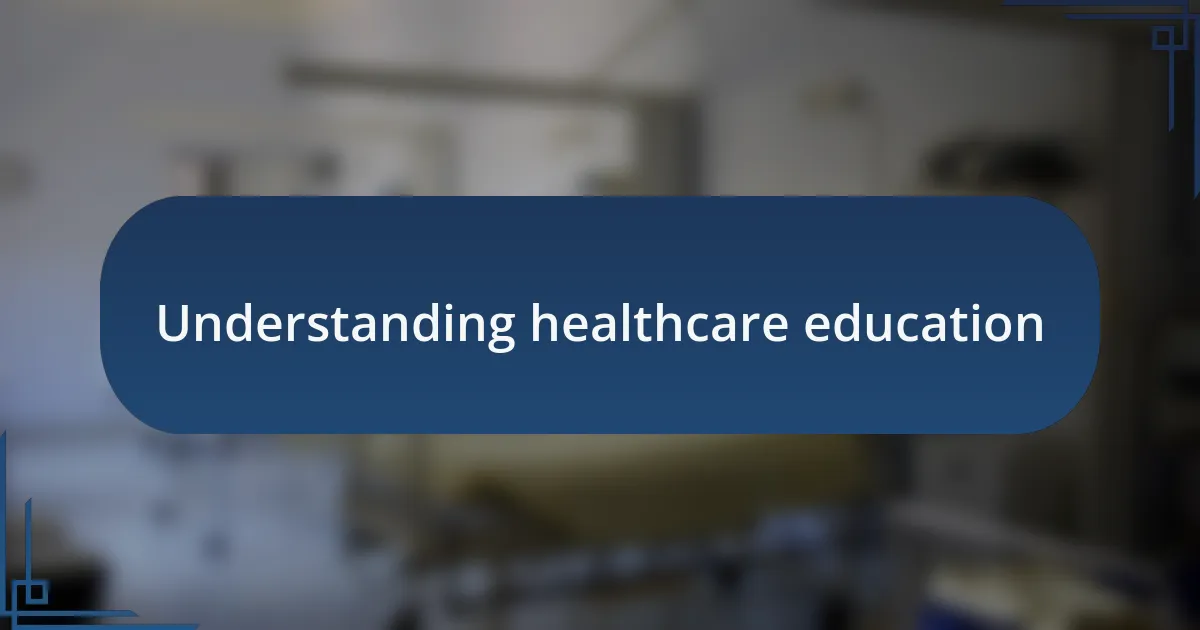
Understanding healthcare education
Healthcare education is a foundational element of effective health promotion and disease prevention. I recall my first days as a health volunteer, immersed in training sessions designed to equip us with essential skills. In those moments, I realized that education isn’t just about imparting knowledge; it’s about inspiring change and empowering communities.
Through my experiences, I’ve witnessed how accessible healthcare education can transform lives. For example, when we organized workshops in underserved neighborhoods, people were not only learning about nutrition and wellness but also sharing their stories, hopes, and fears. Isn’t it fascinating how education can ignite a spark of motivation in individuals, encouraging them to take charge of their health?
What struck me most was the emotional connection we forged within those groups. I often saw a sense of relief wash over participants when they realized they weren’t alone in their struggles. This bonds learning with personal growth, creating an environment where knowledge becomes a pathway to empowerment, illustrating that health education is as much about the heart as it is about the mind.
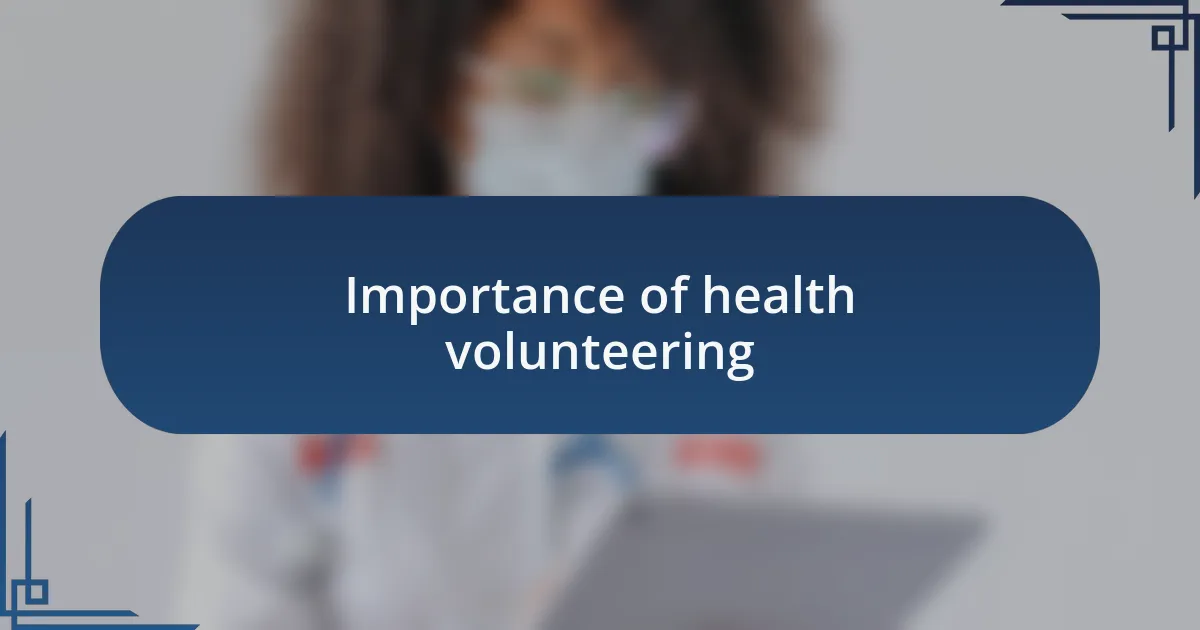
Importance of health volunteering
Engaging in health volunteering can significantly enhance community health, and I witnessed this firsthand during outreach programs. One event stands out when we provided free health screenings. The gratitude expressed by those who often felt overlooked was palpable. It made me realize how a simple act of giving time can bridge gaps in access to vital healthcare services.
Moreover, volunteering fosters a sense of solidarity among diverse individuals. I remember a moment where a nurse and a student worked together to educate residents about preventive care. Seeing them collaborate not only strengthened community ties but also enriched our understanding of the myriad challenges people face. How often do we get to experience such genuine connections that remind us we’re all in this together?
Additionally, the personal growth I experienced through volunteering is invaluable. Each interaction taught me something new, whether about health issues or the resilience of the human spirit. Have you ever felt that rush of purpose when you help someone? It’s this deep fulfillment that drives many to continue their journey in health volunteering, emphasizing its importance not just for those in need, but also for our own development as compassionate individuals.
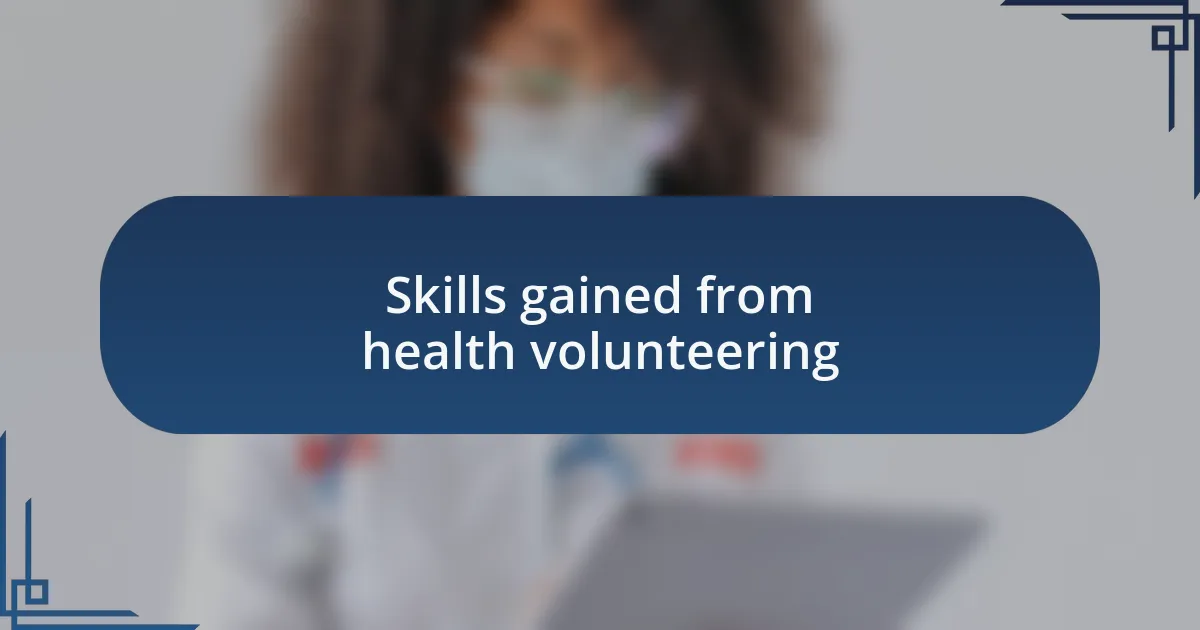
Skills gained from health volunteering
Volunteering in health settings has remarkably sharpened my communication skills. I vividly recall a day at a community health fair where I had to explain health concepts to people from varied backgrounds—some had basic literacy, while others spoke different languages. Adapting my message on the spot made me realize how crucial it is to tailor information so everyone can grasp it. Have you ever tried to convey a complex idea in simple terms? It’s a skill that not only enhances understanding but also builds rapport.
Another skill that I gained is the ability to work efficiently in a team. During one memorable outreach event, I found myself coordinating with healthcare professionals, local leaders, and fellow volunteers, each bringing unique strengths. It was fascinating to witness how our different experiences intertwined to create a cohesive effort. The sense of shared responsibility reminded me that we are stronger together, and I still cherish the friendships formed through that collaborative spirit.
Lastly, health volunteering nurtured my problem-solving abilities. I encountered unexpected challenges like equipment failures or last-minute changes in event logistics. One particular episode involved relocating a health booth with just minutes to spare, which required fast thinking and seamless teamwork. Looking back, how did I navigate those moments? It dawned on me that each obstacle was an opportunity to innovate, pushing me to think creatively under pressure. This adaptability is a skill I carry into every aspect of my life now.
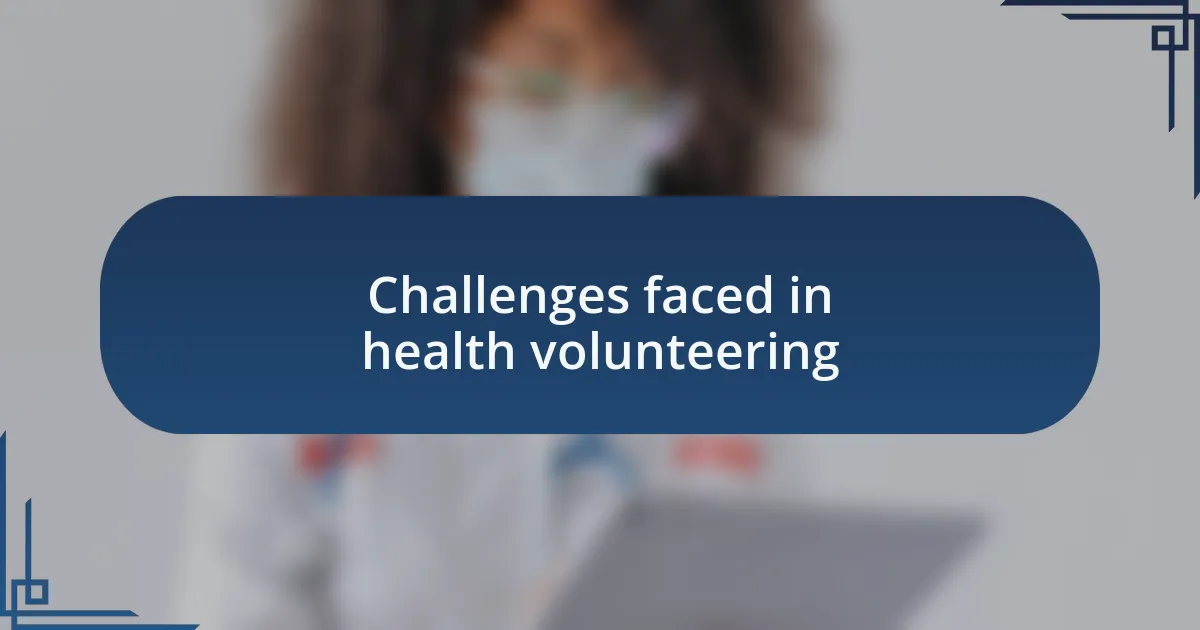
Challenges faced in health volunteering
Volunteering in healthcare can be incredibly rewarding, but it doesn’t come without its difficulties. I remember one event where a sudden influx of patients overwhelmed our small team, leaving us scrambling to provide the necessary care. How do you think we felt in that moment? The pressure was intense, and it pushed me to question not just our resources, but also our preparation for such situations. It opened my eyes to the need for better contingency planning in future projects.
Another challenge that I frequently faced was navigating the cultural sensitivities of the communities we served. During a health campaign targeting underrepresented populations, I noticed varying levels of trust in healthcare providers. I recall feeling a mix of frustration and empathy when people were hesitant to engage. It made me reflect on the importance of building trust and rapport—a process that takes time and patience, which we often underestimated.
Moreover, witnessing the harsh realities of health disparities was emotionally taxing. On one occasion, I came across a family that had been waiting for days for medical assistance due to transportation issues. The helplessness in their eyes was heartbreaking. How do you cope with such emotional weight while trying to help others? I learned to channel that discomfort into motivation, reminding myself that every effort, no matter how small, could make a difference in someone’s life.
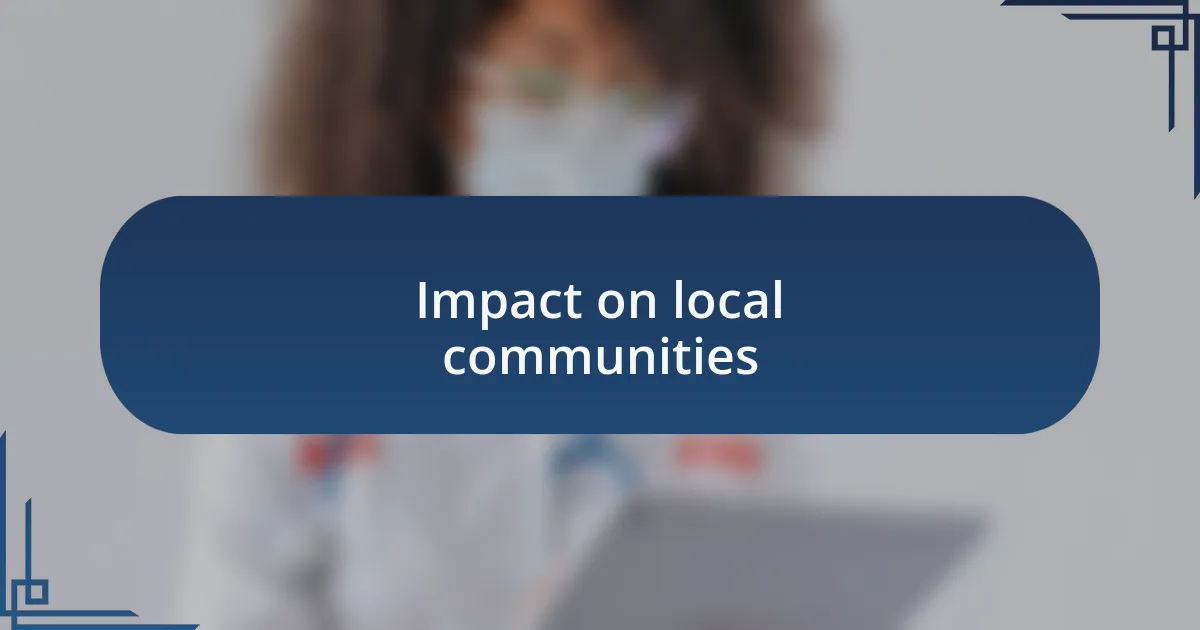
Impact on local communities
Engaging with local communities as a health volunteer deeply changes the dynamics of healthcare access and awareness. I recall attending a village meeting where we discussed the importance of preventive health measures. The moment I saw the community members exchanging ideas, it struck me how empowered they felt by simply being included in the dialogue. Isn’t it remarkable how knowledge can transform not only individual lives but the entire fabric of a community?
In another instance, I participated in a nutrition workshop aimed at families struggling with unhealthy eating habits. Watching children eagerly learn about vegetables and healthy snacks was a highlight for me. Their excitement reminded me of the ripple effect education can create; when families adopt healthier lifestyles, the entire community begins to thrive. How can we underestimate the power of a single workshop in sparking long-term change?
It’s clear that the impact of health volunteering extends beyond immediate care. I remember a partnership we forged with local leaders to tackle mental health stigma in the area. After months of dedicated outreach, I saw residents beginning to openly discuss mental health challenges, which previously were taboo. It left me pondering: how crucial is it for individuals to have a platform for their voices? The shift in conversation was a testament to the power of community involvement and the importance of creating safe spaces for vulnerable discussions.
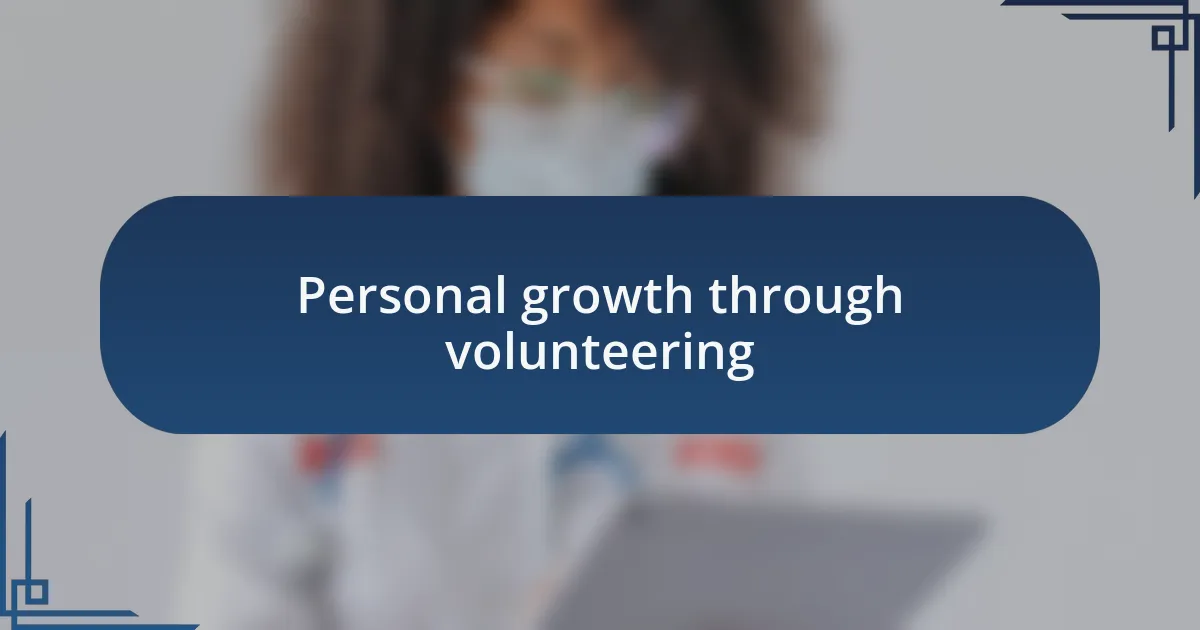
Personal growth through volunteering
Volunteering in healthcare has profoundly shaped my personal development. During one health camp, I found myself leading a physical fitness session, and I felt a blend of nerves and excitement. It wasn’t just about teaching others; I was also learning to trust my skills and step out of my comfort zone. Doesn’t that feeling of growth resonate deeply with anyone looking to push their boundaries?
A particularly memorable moment came when I was asked to mentor new volunteers. I realized that teaching others not only reinforced my knowledge but also honed my leadership skills. It’s fascinating how sharing what you know can elevate self-confidence. Don’t you think that teaching can sometimes be the best way to learn?
Moreover, the emotional resilience I developed through volunteering is invaluable. There were times when I encountered distressing situations that challenged my compassion and patience. Yet, each experience taught me the importance of empathy and the strength that comes from providing support during tough times. Have you ever considered how much our experiences can shape our understanding of human connection?